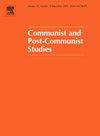宗教和抗议运动
IF 1.3
4区 社会学
Q3 INTERNATIONAL RELATIONS
引用次数: 0
摘要
本文分析了基督教会对2020年白俄罗斯抗议活动的立场。本研究对专制政权中国家-社会关系的研究做出了贡献,因为它细致入微地阐述了公民社会要么被边缘化,要么被专制国家完全吸收的观点。抗议浪潮表明,在一个惩罚任何异议的国家体制中,宗教团体的倡议促进了集体行动。这篇文章认为教会是一个矛盾的空间:在这里,国家可以行使社会控制,但在专制的白俄罗斯,教会比其他组织享有更大程度的自由,因此也可能出现对镇压国家的潜在抵抗。此外,我们的研究认为,在国家和教会之间“契约”的现有法律框架内,宗教可以被视为一个特权的抗议场所。本文透过观察不同宗教信仰在基层为争取自身权利、推动理想政治发展愿景的社会参与,探讨在白俄罗斯参与公民行动的一系列机会。本文章由计算机程序翻译,如有差异,请以英文原文为准。
Religion and the Protest Movement
This article analyzes the position of the Christian churches on the protests in Belarus in 2020. This study contributes to the research on the state-society relationship in autocratic regimes by nuancing the thesis that civil society is either marginalized or fully co-opted by the authoritarian state. The protest wave showed that the initiatives of religious groups fostered collective action in a state system that is punitive of any dissent. The article identifies churches as an ambivalent space: one where the state can exercise social control, but where potential resistance to the repressive state might also occur since they enjoy a greater degree of freedom than other organizations in authoritarian Belarus. Moreover, our study argues that religion can be seen as a privileged arena of protest within existing legal frameworks of the “contract” between the state and the church. By looking at the societal engagement of different religious confessions campaigning for their rights and promoting their visions of desirable political development on the grassroots level, this article addresses a range of opportunities to engage in civic activism in Belarus.
求助全文
通过发布文献求助,成功后即可免费获取论文全文。
去求助
来源期刊

Communist and Post-Communist Studies
Multiple-
CiteScore
1.90
自引率
0.00%
发文量
23
期刊介绍:
Communist and Post-Communist Studies is an international journal covering all communist and post-communist states and communist movements, including both their domestic policies and their international relations. It is focused on the analysis of historical as well as current developments in the communist and post-communist world, including ideology, economy and society. It also aims to provide comparative foci on a given subject by inviting comments of a comparative character from scholars specializing in the same subject matter but in different countries.
 求助内容:
求助内容: 应助结果提醒方式:
应助结果提醒方式:


